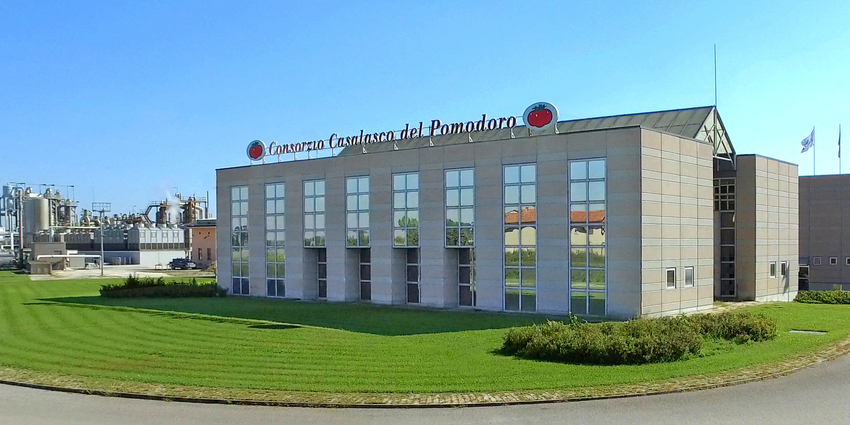- Follow
A report that presents a solid company that places sustainability at the heart of its business, striving to continuously improve its impact on the environment and people.

3 December 2024 - Casalasco, Italy's first integrated tomato chain specialising in tomato processing, packaging and marketing of its by-products, confirms its commitment to the environment, the local area and people and presents its 2023 Sustainability Report: the first report to also cover the results of its subsidiaries Emiliana Conserve Spa, SAC Spa, De Martino Srl and Pomì USA.
Environment, Innovation, Research & Development, People and Supply Chain are the five cornerstones of Casalasco’s sustainable strategy. Casalasco adopts a transparent approach towards all its stakeholders with the common mission of building an efficient and solid chain for value creation.
To guide the Group's strategic sustainability plan, a Steering Committee was set up for the first time in 2023 to launch the ambitious "Road to net zero emission" project. The goal is to minimise the impact during all stages of the supply chain by defining the Carbon Footprint and thus the development of energy efficiency projects, the reduction of climate-changing emissions, and the transition to renewable sources.
Within this context, Casalasco has developed and is implementing in all its sites a structured plan of investments that fall into three main categories: reduction of methane gas consumption through the installation of 7 new evaporators using MVR (Mechanical Vapour Recompression) technology, which, when fully operational, will lead to savings of approximately 1,000,000 cubic metres of gas and 2,000 tonnes of CO2 for each plant and for each processing campaign; efficiency in electricity production through the installation of two high-efficiency cogeneration plants; production of energy from renewable sources, in particular thanks to the agri-voltaic plant, currently under development, which will cover an area of approximately 2 hectares.These measures, planned and started in 2022, are already well advanced in 2023 and will be completed in 2025.
Production-related energy consumption and the resulting carbon emissions are a significant impact of the agro-processing industry.For this reason, in 2023, the Casalasco Group committed to purchasing almost all the energy it uses (94%) from renewable and non-fossil sources, an increase of +369% compared to 2022.
Precisely due to the increased use of energy from renewable sources, Scope 2 market-based emissions decreased by -91% in 2023 compared to 2022, with a total of 2,677 tons of CO2 emitted.Consolidated Scope 1 emissions from the use of methane, diesel, LPG and refrigerant gases also decreased by -3% due to the commissioning of the two new mechanical vapour recompression evaporators at the Gariga and Fontanellato plants.
Regarding waste water, water recovery systems have been set up at all production sites with the aim of limiting its use.Through the installation of cooling towers, dry coolers and recirculation systems, cooling water can be reused for the same purpose or for the discharge and hydraulic transport of tomatoes.
In 2023, 97% of waste was sent for recovery thanks to timely sorting.Proper management of production residues resulted in the recycling of 20,915 t of by-products used as animal feed and biomass.
Innovation, research and development are central to all stages of the supply chain from the field to distribution and involve a multidisciplinary team of agronomic, food, legal and industrial experts.In particular, last year, Casalasco's Research & Development department developed 104 projects (93 in 2022) to create new products in terms of recipe, production process and packaging.Of these, 35% were successfully concluded and 25% are still ongoing.2023 also saw the start of construction of theInnovation Centre, a multifunctional project for agronomic experiments and raw material processing tests to evaluate special varieties.Completion and inauguration is scheduled for the first half of 2025.
Great attention has always been paid to
people, Casalasco's heart and driving force.
Last year, the average number of employees was 1,212, with a peak of 2,078, during the months of the harvest campaign.An equal gender split is confirmed with 46% women and 54% men and a rich ethnic variety with 68% of workers being Italian and the remaining 32% coming from 66 different nationalities.
Finally, in order to maintain a safe and stimulating environment, Casalasco has carried out important training projects with over 17,127 hours reported , equal to 14.13 hours per capita, as well as welfare projects aimed at supporting the employees' well-being with free courses and visits to promote healthy lifestyles, the prevention of oncological diseases , and the promotion of sustainable mobility.
"Even in a very dynamic business environment marked by important changes and new challenges, the focus on the planet, the local area and its community remains an essential reference point for us, and the results documented in this report are a confirmation of this," commented Costantino Vaia, CEO of the Casalasco Group ."We are proud of these results and wanted to present them for the first time in a single document that also includes the subsidiaries, so as to emphasise the importance and perfect integration of all the Group's components in terms of values and objectives, defining a common path towards the ambitious goal of the Road to net zero emissions."